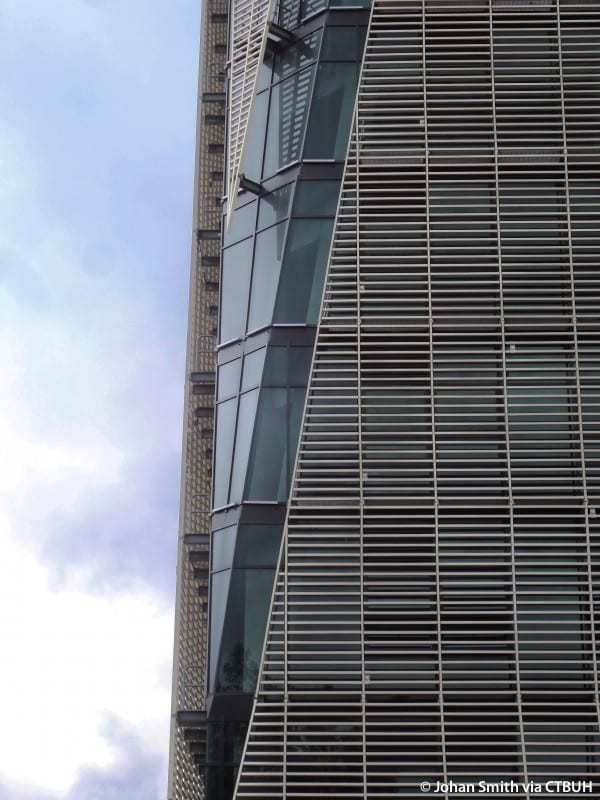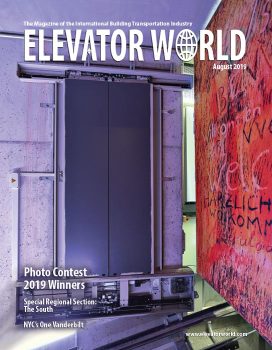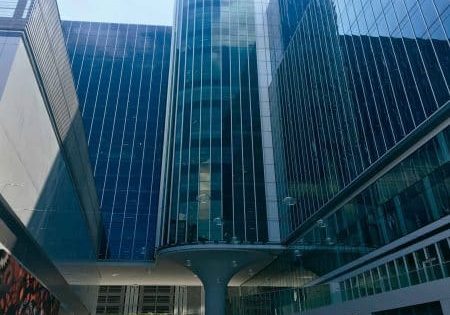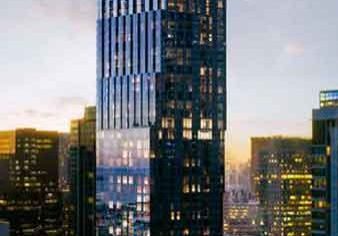A Shining Star in Nairobi
Aug 1, 2019
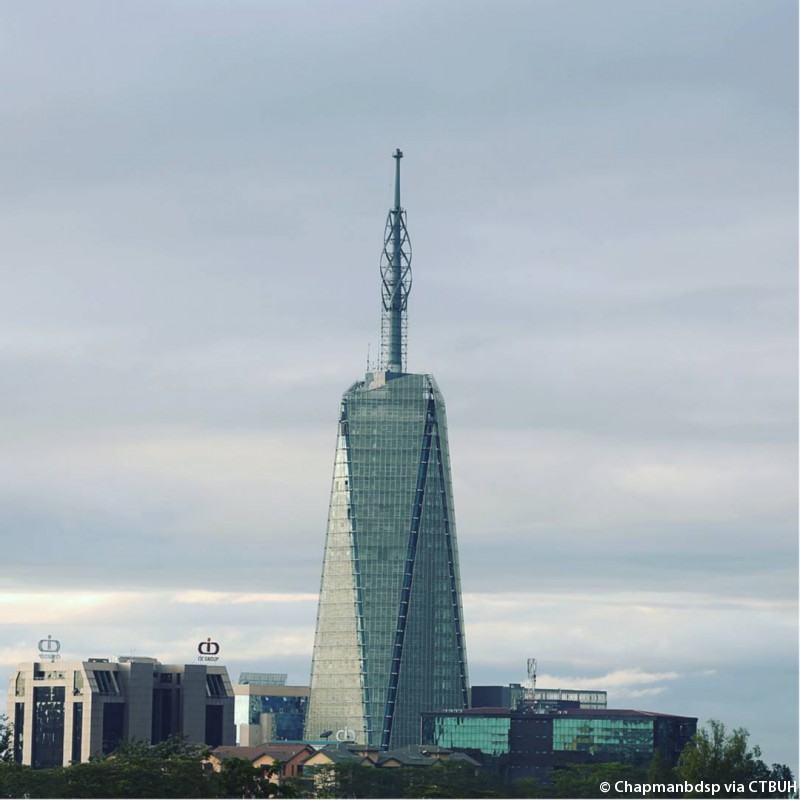
Weak office market fails to prevent an efficient, flexible tower with a Schindler VT system from earning CTBUH award.
The Council on Tall Buildings and Urban Habitat (CTBUH) recently conferred Britam Tower, owned by diversified financial services group British American Insurance Co. Ltd., with the 2019 MEP Engineering Award. This reinforces the emerging trend of high-quality skyscrapers sprouting in Kenya’s capital, Nairobi, despite a notable decline in demand for commercial office space. CTBUH attributed the achievement by Britam Tower, located on Hospital Road in the Upper Hill area, to its “strategic balance of rainwater harvesting, ventilation strategies and passive heat mitigation strategies, [which] saved 39% on energy and 50% on water use compared to [that of ] a typical building.”
The skyscraper, which was completed in 2018, has become the latest tall building to define the city’s skyline. Standing 658 ft., it has become East Africa’s tallest and Africa’s third-tallest skyscraper after Algeria’s Great Mosque of Algiers Tower (869 ft) and South Africa’s Carlton Centre (660 ft). Ian Duncombe, board director of engineering and design consultancy chapmanbdsp, said:
“The MEP [mechanical, electrical and plumbing] system of the Britam Tower was the result of an environmental/engineering approach [to producing a distinctive design] intended to take advantage of the surprisingly benign local climate. Nairobi, 142 km north of the equator, is nearly 1,800 m above sea level. The ‘veil’ façade solution — consisting of 50-mm square, ceramic rods in front of a full-height glass curtain wall with selective glass letting in more light than heat — allowed for natural ventilation on all office floors and good daylighting across 80% of the largest floorplates.”
Duncombe said nearly 24% of the façade is openable, with two levels of openable windows on each floor, allowing flexibility for tenants. In addition, Britam Tower has storage for potable water to last up to five days, with supply kicking in whenever the main water supply is disrupted. Rainwater is harvested and stored in separate, non-potable tanks, and goes through a system so it can be used for flushing toilets. Further, Duncombe added, sensor-controlled taps are provided in the toilets, and the lifts in the tower core have been outfitted with a destination-control system.
The lifts travel from the ground to the top floor in fewer than 30 s, the fastest of any in Africa, according to Britam Group Managing Director Benson Wairegi.
The tower is served by eight elevator units supplied by Schindler with a top speed of 6 m/s, which means shorter wait times. The lifts travel from the ground to the top floor in fewer than 30 s, the fastest of any in Africa, according to Britam Group Managing Director Benson Wairegi. The destination- controlled lifts are also outfitted with sensors for wheelchairs.
The building, which displaces UAP Old Mutual Tower (also in Nairobi’s Upper Hill area) as the city’s tallest building, has a bore hole with adequate water that can be extracted at the rate of 8,000 l per hr. This, coupled with a large storage facility, helps the building remain independent of the area’s notoriously unreliable utilities, Duncombe observed, elaborating:
“Two generators provide full support and backup for the landlord and a significant number of tenants, with space provision for a third, if needed. The car park’s basement and ground floor are mechanically ventilated, and upper levels are naturally ventilated. A provision for a data center to be added on the upper level [also exists].”
The tower, which Wairegi said is targeting institutional (as opposed to individual) tenants was designed by GAPP architect and urban designer and Triad Architects with Howard Humphreys (East Africa) Ltd. as structural engineer.
With a gross floor area of approximately 797,326 ft2, Britam Tower, which was constructed with reinforced concrete as frame material, rises 31 floors above and three floors below ground. The building has a separate, five-story silo with 1,002 parking bays, one of the largest in East Africa. Britam Tower has a 60-m-high mast on top that is home to three helical wind turbines. The turbines “generate electricity, contributing to the tower’s sustainability features,” according to chapmanbdsp.
Elsewhere, there are an estimated 20 buildings taller than 213 ft either planned, under construction, approved or on hold. Palm Exotjca, planned for Watamu Beach in the tourist town of Malindi on Kenya’s coast, is the tallest at 1,210 ft. Next is the 1,050-ft-tall Pinnacle Tower, which will be completed in 2020 in Nairobi’s Upper Hill area by a subsidiary of Hass Petroleum Group and White Lotus Group.
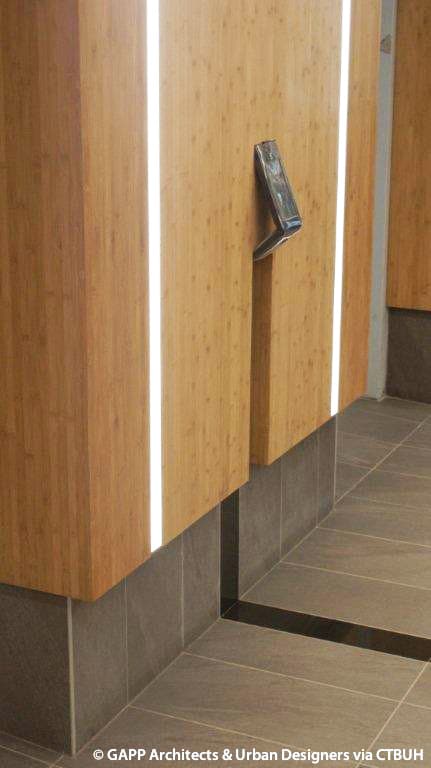
Real Estate Woes
In Nairobi, demand for office space has been on the decline, with analysts projecting a prolonged negative outlook in the short term, even as innovative property developers are leveraging commercial buildings’ differentiated concepts — such as serviced offices and green buildings — to attract more clientele.
Moreover, installation of faster, more efficient, safer, more comfortable and more economical elevators and availability of parking space have become key selling points for several property developers in Nairobi, despite a reported surplus of commercial office space since late 2016.
Nairobi-based independent investment management firm Cytonn Investment Plc, which also has offices in the Washington, D.C., metro area, said there was a 4.7 million-ft2 oversupply of commercial office space in 2017, a 62.1% increase from the 2.9 million ft2 recorded in 2016. Although the company had predicted 3.2 million ft2 of office space in 2016, the forecast was exceeded by 46.9% in 2017 on the back of a:
“4.8% point decrease in occupancy rates and increased supply, with 3.5 million ft2 delivered in the market with commercial buildings such as FCB Mihrab and Vienna Court opening in the Kilimani area; Dunhill Towers, Sanlam Towers, Westpark Suites and Westside Towers in Westlands; and Britam Tower in Upper Hill, among others.”
In spite of the current oversupply of office space in Nairobi, the race for building taller skyscrapers continues unabated, opening up additional business opportunities for elevator manufacturers and suppliers as more businesses in the city are concentrated in Upper Hill, away from the congested CBD, which Cytonn says “has been relegated to playing a mainly retail function due to its high footfall.”
Get more of Elevator World. Sign up for our free e-newsletter.
